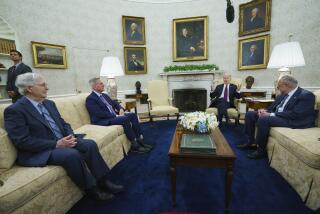Would President Obama try stimulus spending again?
- Share via
If he wins a second term, will President Obama try for another large infusion of government spending to turn an anemic economic recovery into something more robust?
Los Angeles Times economic policy reporter Don Lee reminded us over the weekend about how the administration got less than half what it originally hoped for with $800 billion in tax cuts and government spending in 2009. The administration initially proposed a $1.8-trillion plan.
Many economists on the Democratic side have been arguing vehemently that the threat from long-term debt is not nearly as great as the long-term damage from allowing the recovery to continue to sputter, costing millions of jobs and the tax receipts that come with them.
It’s hard to imagine today that Obama would expend much political capital in trying to win more government spending — given the Republican Party’s control of the House and the public’s lukewarm, at best, response to increasing the deficit. Given that reality, the pro-stimulus argument has been raised only fleetingly in Washington.
PHOTOS: Obama on the campaign trail
But Obama will continue to hear, from those who are like minded on many other matters, that the economy will not truly take off without the U.S. doing more. New York Times columnist Paul Krugman, the Nobel Prize-winning economist, has been the loudest voice for the government to intervene again.
“Markets are great things,” Krugman told PBS’ “NewsHour” earlier this summer. “And most of the time, you want to let markets rip. But there are certain times and certain conditions under which you don’t. When you’re in a prolonged slump, a depression, that’s when you need government intervention.”
Krugman added that low interest rates made borrowing for more spending less onerous than it would be at other times.
“If this isn’t the time to be spending a lot more on things that are useful, like educating our children and fixing the holes in our roads, when is the time?” he said on PBS. “If you are a businessman and somebody said, OK, you have got a bunch of investment opportunities and right now we will let you borrow money for nothing, you would be derelict in your duty if you didn’t do it.”
Conservatives have argued that the total national debt -- $12 trillion when Obama took office in 2009 and now $16 trillion — has grown far too large and will put a bigger and bigger burden on future generations.
Although it’s become Republican orthodoxy that the earlier government spending did nothing to reduce unemployment, that is not a view borne out by the facts or by most economists. As The Times’ Lee noted, a February survey by the University of Chicago found that 80% of economists across the political spectrum said the spending reduced unemployment.
INTERACTIVE: Battleground states map
Many Americans have doubtless forgotten that the vast majority of taxpayers had their payments reduced as a result of the plan. Other spending helped stave off state budget cuts that would have led to layoffs of teachers, firefighters and other public employees.
Pew Research Center polling shows that the public’s view of the 2009 stimulus has improved over time — 49% disapproved in 2010, compared to just 41% who disapproved earlier this year. That wasn’t too many more than said they approved of the $800-billion package — about 37%.
The most important number on stimulus spending will be the number of each political party in Congress. With the current power-sharing arrangement between a Democratic White House and a Republican House of Representatives, additional government spending to goose the economy will almost certainly be DOA in 2013.
Follow Politics Now on Twitter and Facebook
Twitter: @latimesrainey
More to Read
Get the L.A. Times Politics newsletter
Deeply reported insights into legislation, politics and policy from Sacramento, Washington and beyond. In your inbox three times per week.
You may occasionally receive promotional content from the Los Angeles Times.











